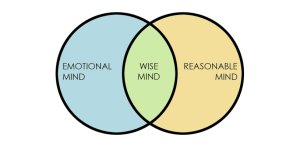Wise Mind and DBT
If you haven’t heard of Dialectical Behaviour Therapy (DBT) before, in short, therapists utilize it to help clients living with emotional reactivity, self-harm and addiction challenges, and relationship difficulties to build skills in mindfulness, emotional regulation, interpersonal skills and distress tolerance to improve the quality of their lives and connections.
DBT incorporates a concept called wise mind throughout it’s programs. Essentially, our mind creates patterns of thinking, whereby we can become biased towards a particular thought pattern which may not be serving us and when we are in a highly emotional state it can be difficult to think clearly without completely invalidating our own emotions. When we are using our wise mind – we are focusing on bringing in both our emotional mind and our rational thinking mind to ensure we are not overly focused on one over the other.
What are the 3 states of mind?
If we find we are overly focused on facts and logic, then we are likely in the rational thinking brain. From this place it is very easy to quickly discount our emotional experience, dismissing it as illogical and incorrect. Unfortunately, invalidating our emotions can lead to emotional disconnection and suppression, along with an array of unhealthy coping mechanisms that “support” us to stay in our rational mind. Our emotions are likely to come out in bigger and uglier ways down the track when we suppress them and our disconnection makes it difficult to attract and sustain meaningful relationships because we are emotionally unavailable. In addition, as “we can not selectively numb” (thank you Brene Brown for that insight) we are likely also robbing ourselves from all the positive feelings too.
Similarly, if we find we are being overly driven by our emotional mind, we may find our feelings to be intense, overwhelming and to be running our lives. As such, our behaviour is likely to be more reactive, and we can have a sense of our emotions being completely out of our control. It can be difficult to manage relationships from our emotional mind as we and the people we love can feel like they are on a rollercoaster, with our emotions in the driver’s seat. In addition, this can lead to us trying to control our external environment (e.g., people, outcomes) in an attempt to find a sense of stability or seeking out ways to numb what we are feeling (e.g., drugs and alcohol, self-harm), which as described in the context of the logical mind does more harm than good, not to mention the other stressors and impacts of addiction and hurting ourselves.
Thus in a DBT approach, we work towards finding that middle ground between our emotional and thinking mind – which we call our wise mind. Our wise mind is a more balanced approach that considers both the perspective of the logical thinking brain and the emotional brain and thus helps us make a decision from this place on how we want to respond to a situation. This shift can have a powerful impact on how we engage in relationships, treat and take care of ourselves and how we behave in the world, the list goes on.
Image credit: Therapist Aid (therapistaid.com)
How do I know I’m in Wise Mind?
I would like to say, when you are doing it, you will know… but perhaps that is a little too presumptuous of me. When I am in my wise mind it feels like this…
- I’ve acknowledged my feelings, non-judgmentally (don’t have to be happy that I am feeling that way, but it is important to validate you feel, how you feel for a reason, and accept that those feelings have come up without bashing yourself for it)
- I have consider the facts (I have taken some time to look at the logical side of things, considered not just my own but the other person’s perspective, thought about long term not just short term consequences and considered my values, the person I want to be)
- You feel centered free to do what needs to be done (not always gracefully, but you can take action from this place)
Easier said than done, I know! But working with a therapist trained in DBT to assist you in building the skills to be able to do this is usually the first step. Because it is at the end of the day a skill. A skill that can have a pretty powerful impact.
Author: Samantha Sheppard, B Psych (Hons).
Samantha is a registered psychologist with experience working with children and adolescents (and their families), young adults and adults. Samantha empowers others with their mental health using a non-judgemental, compassionate approach, and particularly resonates with the social and emotional wellbeing framework.
To make an appointment with Samantha Sheppard try Online Booking. Alternatively, you can call M1 Psychology Loganholme on (07) 3067 9129.
